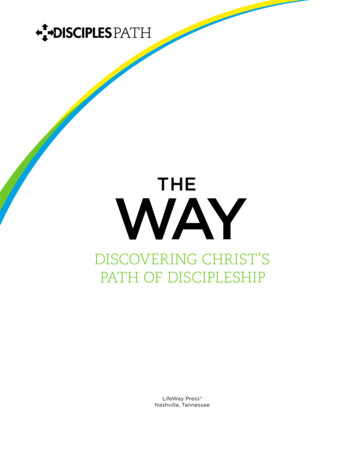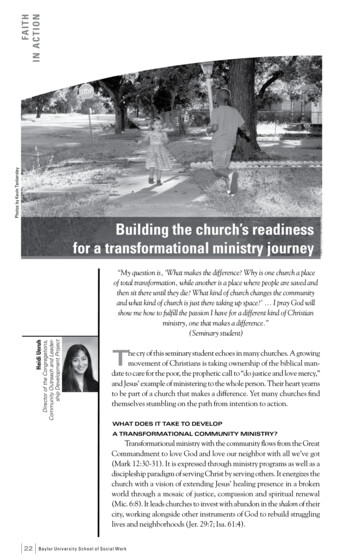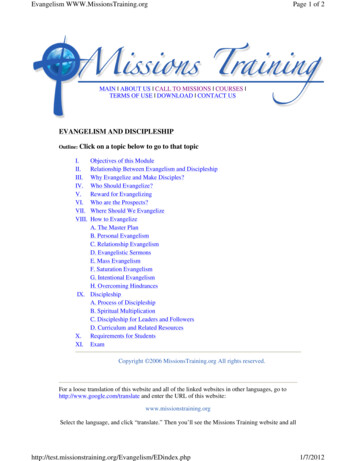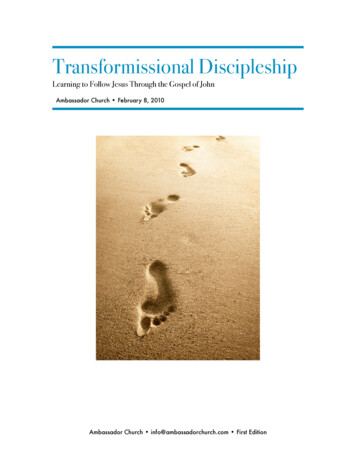
Transcription
Transformational Discipleship, Digital EditionBased on Print EditionCopyright 2012by B&H Publishing Group and LifeWay ResearchAll rights reserved.Printed in the United States of America978-1-4336-7854-7Published by B&H Publishing GroupNashville, TennesseeDewey Decimal Classification: 248.84Subject Heading: DISCIPLESHIP \ CHRISTIAN LIFE \ SPIRITUAL LIFEAll Scripture quotations are from the Holman Christian Standard Bible .Copyright 1999, 2000, 2003, 2009 by Holman Bible Publishers. Used bypermission. Holman Christian Standard Bible , Holman CSB , and HCSB are federally registered trademarks of Holman Bible Publishers.
CONTENTSIntroduction1: Deficient Discipleship2: Disciple to Win3: Transformational Sweet SpotPart 1: Transformational Framework: TRUTH4: The Gospel Lens5: The Identity Lens6: The Discipline LensPart 2: Transformational Framework: POSTURE7: Weakness8: Interdependent9: OutwardPart 3: Transformational Framework: LEADERS10: Leaders11: A Transformed DiscipleAbout the AuthorsNotes
DEDICATIONFROM ERICFor my daughter Evie, full of life:You brighten every room and constantly bring joy to your daddy.In memory of two friends and pastors, Bill Carp and Michael Smith. When Iwas in a teachable posture as a nineteen-year-old youth pastor, Michael was aleader who supplied wisdom and direction. When I was new in Miami andfeeling vulnerable, Bill, who served at the Vineyard, was a leader who providedgodly friendship and encouragement.FROM MICHAELFor the people of Grace Community Church:It continues to be my great joy to see how the gospel is continually preachedand lived out in our midst.FROM PHILIPFor my sons, Andrew and Chris:My hope is that you will live wild adventures for our great King.
INTRODUCTIONby Ed Stetzer and Thom Rainer"WE WANT TO GO DEEPER."If you've been involved in church leadership for very long, that's a phraseyou've probably heard before. Christians far and wide are craving to "go deeper."Fair enough, but the problem comes in knowing exactly what that means. Does itmean deeper in knowledge? Does it mean deeper in intimacy? In love? This iswhen the issue becomes more complicated.Nevertheless, the sentiment is valid: Christians want to grow in their faith.Really grow. This is not only an encouraging and worthwhile desire but abiblical one as well. One of the most beautiful images of this kind of growthcomes straight from the description of the man who trusts in the Lord fromJeremiah 17:7–8: "The man who trusts in the LORD, whose confidence indeed isthe LORD, is blessed. He will be like a tree planted by water: it sends its rootsout toward a stream, it doesn't fear when heat comes, and its foliage remainsgreen. It will not worry in a year of drought or cease producing fruit."How is it, even during times of great drought, that such a tree never ceases tobear fruit? It's because the roots of that tree have grown deep.Several years ago we wrote the book Transformational Church. Based onone of the largest research projects ever completed on church health, it offered amessage of hope for the church. Far from the pessimism that abounds regardingthe state of the church in many circles, through extensive research we found thatmany churches are flourishing. People are growing, and entire communities arebeing transformed because of believers that care more about God's mission thanthe survival of traditions.The church is alive and well, and certain tendencies mark congregations thathave a profound, transformational impact. Among the conclusions from that
project was this simple but powerful one: God shapes congregations through theshaping of individual lives. Further, this shaping of individuals doesn't justhappen; it's through intentional effort on the part of both leaders and churchmembers.While most every leader knows this is true, much confusion still aboundsabout how people really grow. The book you hold in your hands is meant to be ahelpful tool in describing that process. It's the next step in discovering how Godshapes and forms believers into the kind of people described in Jeremiah 17.What you'll find in this book isn't a prescriptive process. It isn't a magicformula or a church mantra to be echoed. Instead, it's the result of extensiveresearch with churches and individuals who have answered the call of Jesus tomake disciples. It's not only the compilation of their wisdom and stories but alsoa guide for leaders to practice the kind of intentional efforts it will take in orderto create not a program but an entire culture in which people will grow.And they will grow. It's not because of what you read in this book. Neither isit because of any program that might be instituted. Rather, it's because disciplesare being made in the same way they've always been made—by the power of theHoly Spirit working through the church. It is when people of God engage in themission of God through the Spirit of God.The three authors who have taken on the task of writing this book are menwe know and trust. Eric, Michael, and Philip love Christ and serve His church.Each has a unique perspective because of their individual journeys ofdiscipleship. But they agree that the church can and must do better. So, withfaithfulness to the Scriptures and data from the most recent research aboutspiritual development, they have written Transformational Discipleship.Our great hope is that as you read, you will begin to see both the simplicityand the complexity of the great task before us. We hope you will be renewed inyour vision to see people grow in Christ, and you will find new hope for all Godis doing in and through His people.
1Deficient DiscipleshipChristianity without the living Christ is inevitably Christianity without discipleship, andChristianity without discipleship is always Christianity without Christ.—Dietrich Bonhoeffer1he was almost completely alone. He faced deathwithout the company of those who swore their allegiance. Most of his trustedand closest friends deserted him. Some fled and painfully betrayed him. Theworld scorned him.But not this disciple.This disciple would remain faithful to death, following his leader to thegrave. His mind was fully committed, his will set on his leader's agenda, and hisheart thrilled by the intimacy of the relationship with his teacher. He was in aweof his king, humbled to be included in the inner circle. This disciple wrote of anearly encounter with his leader:IN THE LEADERS'S FINAL HOURS,Great joy. He greets me like an old friend. And looks after me. How Ilove him! Then he speaks. How small I am.2Later the disciple penned these words about his leader's teaching andinfluence:When he speaks, all resistance breaks down before the magical effect ofhis words. One can only be his friend or his enemy. He divides the hotfrom the cold. But lukewarmness he spits out of his mouth.3
The disciple is famous, just as his leader.Before his death he said of himself and his leader, "We shall go down inhistory as the greatest statesmen of all time, or the greatest criminals."The disciple's name was Joseph Goebbels, and he was a disciple of hisFuhrer (his leader), Adolph Hitler. While others deserted Hitler, Goebbels spenthis last days alongside him in Hitler's secure bunker. When Hitler committedsuicide, Goebbels and his wife followed closely behind after killing their sixchildren. Goebbels was correct; they are known as the greatest criminals inhistory. The atrocities they committed against humanity are disgusting. Theirplan to eliminate the Jewish people was twisted and evil.Goebbels was a true disciple of Hitler, a follower, a student. He trusted andemulated his leader. He was discipled, but his heart was obviously nevertransformed. He died a wicked man with a depraved heart of stone.Not all discipleship is transformational.Chris Farley is still regarded as one of the funniest comedians of ourgeneration. From his sketches on Saturday Night Live to the movies he starredin, Farley was a success in the entertainment business.Chris Farley was impacted by the example and influence of another famouscomedian: John Belushi. In a real sense Farley was a disciple of Belushi. Farleyfamously admitted, "I wanted to be like him in every way." John Belushi movedfrom the comedy troupe, Second City, in Chicago to Saturday Night Live tostarring in movies. Farley followed the same career path.Farley's emulation did not stop there. Both Belushi and Farley struggled withobesity and had a reputation for wild living. Sadly Belushi died of a drugoverdose when he was only thirty-three years old. And years later, after a nightof partying, Chris Farley was found dead in his apartment from a drug overdose.He was thirty-three years old. While his mentor impacted his aspirations and hisbehavior, his mentor never transformed his heart.Not all discipleship is transformational.Nontransformational Discipleship
Every person who has ever lived is a disciple. Every person in your church,neighborhood, and community is a disciple. In the New Testament the word fordisciple is the Greek word mathetes, which can also be translated pupil orapprentice. Disciple simply means "learner or student." Therefore, everyoneeverywhere is a disciple of someone. Or something.Every person who has ever lived is adisciple.Jesus warns us to be careful whom we follow because, as happened withGoebbels and Farley, we will become like our leader. In Luke 6, Jesus gathereda large crowd to Himself and challenged the people to consider carefully whothey would learn from, who they would follow. They had many teachers tochoose from, and Jesus used a brief parable to show the people the seriousnessof the choice.He also told them a parable: "Can the blind guide the blind? Won't theyboth fall into a pit? A disciple is not above his teacher, but everyone whois fully trained will be like his teacher." (Luke 6:39–40)Jesus was speaking among a plethora of religious teachers who led peopleaway from the grace of God. To the crowd Christ was saying, "Follow the wrongleader, and he will lead you into a pit." We become like the teacher we admire,so be careful.When Jesus entered our world, He intentionally stepped into a Jewishdiscipleship paradigm filled with rabbis and disciples. There were numeroustraveling rabbis in Jesus' culture, but their discipleship was not transformational.The learners were impacted by the knowledge and skills they learned, but their
hearts were never transformed. Everyone is a disciple, but not everyone istransformed.Only one Leader brings transformation to His disciples.Discipleship apart from Jesus is nontransformational. It may bring changes,but it essentially leaves you in the same spiritual state as it found you. Thediscipleship may provide education, improve behavior, increase happiness, addvalue, or make the disciple more skilled at a craft. But these are just changes. It'sthe reskinning of the same thing on the inside.Surely we can all relate to what it means to be discipled by culture. If not,just take a look at a picture of yourself from fifteen or twenty years ago. Thoseclothes? That hairstyle? The music you were listening to? Looking back, youcan't believe you thought any of those things were acceptable, much less cool.What's worse, you can't imagine that you—you—would ever wear or listen to it.But the you of middle or high school was absolutely convinced not only thatyour clothes or music was cool but that they were what you really wanted.Discipleship apart from Jesus may be many things, but it is not transformational.Jesus is the only Rabbi who has the power to transform lives.Jesus isn't just a passing fad, soon to be replaced by another right around thecorner. If you believe what the Bible says, Jesus doesn't change people's clothes;He changes the very fabric of people's being. He brings light to darkness. Hebrings death to life. He brings new to the old. The transformation Jesus offers isradically different from simply being conformed to the world.One of the clearest statements in the New Testament that makes thisdistinction is in the well-worn verses of Romans 12:1–2.Therefore, brothers, by the mercies of God, I urge you to present yourbodies as a living sacrifice, holy and pleasing to God; this is yourspiritual worship. Do not be conformed to this age, but be transformed bythe renewing of your mind, so that you may discern what is the good,pleasing, and perfect will of God.
The difference is vitally important. The world seeks, through a millionmarketing messages every day, to conform our thinking to its standards. Most ofus are more influenced by these messages than we realize. We will, in fact,either be conformed or transformed. Jesus isn't merely interested in conforming—changing the appearance and behavior of people. He's interested intransformation. Transformation is more than a surface-level alteration; it'sactually becoming something else entirely.Not all discipleship is transformational, but transformation only comesthrough the discipleship that is centered on Jesus.Transformation only comes through thediscipleship that is centered on Jesus.Discipleship DeficiencySince Christ-centered discipleship results in transformation, we canconfidently assert that most churches are deficient in discipleship. This is ascathing claim as our entire mission as believers and churches is to "makedisciples." After His death and resurrection, Jesus was clear in His command toHis first disciples:Go, therefore, and make disciples of all nations, baptizing them in thename of the Father and of the Son and of the Holy Spirit, teaching themto observe everything I have commanded you. And remember, I am withyou always, to the end of the age. (Matt. 28:19–20)The reason Jesus left His disciples on the planet was to make other disciples.The fundamental reason your church exists is to make disciples of Jesus.To the church at Colossae, the apostle Paul wrote a defining statement about
his ministry to the church:I have become its [the church's] servant, according to God'sadministration that was given to me for you, to make God's message fullyknown, the mystery hidden for ages and generations but now revealed toHis saints. God wanted to make known to those among the Gentiles theglorious wealth of this mystery, which is Christ in you, the hope of glory.We proclaim Him, warning and teaching everyone with all wisdom, sothat we may present everyone mature in Christ. I labor for this, strivingwith His strength that works powerfully in me. (Col. 1:25–29)The apostle Paul labored with the energy of Christ to present everyonemature and transformed in Christ. Because Paul was convinced thattransformation only comes through Christ, he labored to make disciples of Jesusand not of himself.For a church to be deficient in discipleship is to be deficient in itsfundamental reason for existence. If any organization is careless in its corereason for existence, it doesn't matter if the organization excels at other things.If Apple is deficient in designing computers, it doesn't matter if they excel inoutfitting and decorating their stores. If Starbucks is deficient in coffee,mastering the art of creating loyal employees means nothing. To be deficient inyour core reason for existence is always unacceptable.We have learned to do many things as church leaders and members.We build buildings.We design programs.We staff our churches.We put on events.We rally people around new initiatives.And as our churches grow, we become increasingly proficient in a myriad ofother things from branding to facility management. But are we making disciples?Have we become proficient in many things while simultaneously becoming
deficient in the one thing that matters most?When the apostle Paul felt compelled to defend his ministry, he did not pointto his savvy leadership, the size of this team, the creativity or innovation in hisministry, his speaking ability, or even the number of mission trips he wasleading. He simply pointed to the transformation in people's lives.Are we beginning to commend ourselves again? Or do we need, likesome, letters of recommendation to you or from you? You yourselves areour letter, written on our hearts, recognized and read by everyone. It isclear that you are Christ's letter, produced by us, not written with ink butwith the Spirit of the living God—not on stone tablets but on tablets thatare hearts of flesh. (2 Cor. 3:1–3)Paul essentially says: "I don't need a resume that outlines my effectiveness asa disciple-maker. Look at the transformed lives because those lives are theresume. But please understand, I did not write the resume. Christ did. And whenHe wrote it, He wrote it on the hearts of people." Transformation is the bottomline result of true discipleship.Looking into the ChurchSo how can we—the church—know whether or not transformationaldiscipleship is occurring? We decided to study the issue. In 2008, LifeWayResearch surveyed seven thousand churches to discover the principles involvedwith congregational health and published their findings in the bookTransformational Church. The findings from that research project have helpedmany churches find renewal and their place in God's mission. The"Transformational Church Assessment Tool" (TCAT) crafted from the studyfindings is being used by churches in urban, suburban, rural, domestic, andinternational locations to rediscover who God intends them to be.In 2010, LifeWay Research embarked on another ambitious research project:to survey believers about their spiritual lives and level of maturity. Building on
the Transformational Church survey and the research behind the book The Shapeof Faith to Come by Brad Waggoner, we looked into the major areas of lifewhere spiritual maturity takes place.The research was done in three phases. First, a qualitative survey of expertsin the field of discipleship was completed. Members of the research team didinterviews with recognized experts including pastors, professors, and churchleaders from a variety of backgrounds. Here is the list of experts we spoke to:Jerry Acosta—evangelism coordinator with the Venezuelan NationalBaptist ConventionFrancisco Aular—pastor in Canada and founder of the Latin AmericanBaptist Discipleship MovementHenry Blackaby—president of Blackaby Ministries and author ofExperiencing GodLuis "Gary" Cesar—senior pastor of First Baptist Church SateliteMarigene Chamberlain—professor at Samford University and formermember of General Board of Discipleship, The United MethodistChurchNeil Cole—founder and director of Church Multiplication AssociatesRobert Coleman—author of Master Plan of DiscipleshipHector Hugo Arias Contreras—leader at the Chilean Baptist ConventionEarl Creps—professor of leadership and spiritual renewal at Assembliesof God Theological Seminary and author of Off-Road DisciplinesEdgard Castano Diaz—senior pastor of Central Baptist Church, Bogota,Columbia, and former president of the Colombian Evangelical CouncilJon Ferguson—teaching pastor, Community Christian ChurchAngel Mena Garcia—pastor and denominational leader with theAssemblies of God in PanamaAlton Garrision—assistant general superintendent, Assemblies of GodBillie Hanks—founder of Operation MultiplicationAlan Hirsch—founder of ForgeT. W. Hunt—author of The Mind of Christ and The Doctrine of Prayer
Mary Kassian—professor at The Southern Baptist TheologicalSeminary and author of In My Father's HouseLarry Lee—executive secretary of Youth and Leadership Developmentof National Evangelical Christian Fellowship MalaysiaAubrey Malphurs—founder of The Malphurs Group, professor at DallasTheological Seminary, and author of Advanced Strategic Planning andStrategic Disciple MakingRobertson McQuilkin—president emirtus of Columbia InternationalUniversityJaime Riquelme Miranda—pastor and leader of the Chilean MinistersAllianceAlexander Montero—director of Venezuelan National BaptistConventionSteve Murrell—founding pastor of Victory Fellowship, ManilaWaldemar Morales Roca—director of Guatemala Baptist SeminaryLeonard Sweet—professor at Drew University and author of TheGospel According to StarbucksNatan Velazquez—pastor of Emmanuel Baptist Church, Caracas,VenezuelaVictor Villanueva—leader at the Mexico National Baptist Conventionand professor at Yucatan Autonomous UniversityDon Whitney—professor of biblical spirituality at The Southern BaptistTheological Seminary and author of Spiritual Disciplines for theChristian LifeAs you can see, it is a diverse lineup. From these experts in the field ofdiscipleship, the research team gained a better understanding of what is takingplace in the church both domestically and in other countries (specifically in theHispanic context).After the expert interview phase, the research team conducted a survey ofone thousand Protestant pastors in the United States. The survey discovered thetype of discipleship ministries being used in churches and the satisfaction level
they have with them. The survey revealed a great deal of paradoxes occurringbetween pastors' hope that people are maturing and the level of satisfaction theyhave that believers truly are maturing.Finally, LifeWay Research did a survey of four thousand Protestants inNorth America. Of that number, approximately eleven hundred were in Canada.The survey was done in three languages: English, Spanish, and French. Thesurvey was built on research from the Spiritual Formation Inventory (SFI) thatcame from Waggoner's previous research. In the SFI research, seven domains ofthe Christian life were identified that lead to spiritual health in a believer. Theteam built on the seven domains and added factors based on the expertinterviews. Ultimately the research revealed an eighth domain that points tospiritual health. We will refer to these as attributes of discipleship.Throughout the upcoming chapters, we will refer to statistics from the eightattributes. Though this is not a statistically heavy book, research findings will bepresent throughout. We believe that the Bible is sufficient for equipping us togrow in our faith. We also believe that seeking to understand what Christ isdoing in His people in the current day is a wise course of action.So, when you see a statistic quoted, don't pass by too quickly; but, as wehave done, seek to learn from what God is doing in our brothers and sisters inthe faith. We all need to learn what practices and attitudes will most effectivelybe used by Christ to transform us into His likeness.Sadly, we can make this bold diagnosis based on the far-reaching andsobering research:There is a discipleship deficiency in most churches resulting in a lack oftransformation.In the survey of one thousand Protestant pastors regarding the status ofdiscipleship in their churches, only 47 percent agree with the statement: "I amsatisfied with the state of discipleship and spiritual formation in our localchurch." Though the study revealed that most churches have an intention of
discipleship, most leaders are not satisfied with the effectiveness of theirministry.When the same group of pastors was asked about the statement, "We areconsistently hearing reports of changed lives at our church," they gave a 49percent response to "strongly agree" and 41 percent to "somewhat agree"categories. At best, we have some paradoxes to deal with from church leaders.They know lives are being changed at some level but not with consistency fromthe ministries of the church. The sad reality is that the daily lives, aspirations,and desires of many people in our churches mirror those who do not claim toknow Christ.Facing the Discipleship RealityWe have a transformation problem.But we have known that, and you know it too. So instead of conducting aresearch project primarily aimed at further exposing the lack of transformationaldiscipleship in most churches, we took another angle. The team of researchersand leaders from LifeWay Research sought to uncover what kind of discipleshipis truly transformational. We dug into the lives of the people in churches wherechanged lives are more the norm than the exception. The research also includedpersonal interviews with discipleship experts, godly leaders who have pouredtheir lives into seeing transformation in people. Then, using their insights andprevious research, we conducted an in-depth survey with four thousand believersin North America (using English, Spanish, and French surveys). The results haveled us to understand better what is happening among God's people and to havehope for the possibility of transformational discipleship.We have a transformation problem.
From the research we developed a framework for transformationaldiscipleship, which we will present in chapter 3 and unpack throughout the book.But we need to lay a discipleship foundation first.Discipleship is a word that is often hijacked and haphazardly tossed aroundto describe a multitude of things. And because it has become such a nebulousterm, people launch complaints about a ministry described as "discipleship" thatmay not have the slightest resemblance to what is possible in deliveringtransformation to people.Perhaps the deficiency flows from a faulty understanding of discipleship. If achurch or an individual has an inaccurate view of discipleship, the resultingimpact is horrifyingly huge. We have observed two common yet flawed viewsthat unfortunately impact a church's likelihood to make disciples that aretransformed: equating information with discipleship and viewing discipleshipmerely as behavioral modification. Discipleship is much more than informationand much deeper than behavioral modification.More than InformationMany churches equate discipleship with knowledge. If you are a churchleader with this predisposition, you believe the solution to a discipleshipdeficiency is more classroom time. Churches who view discipleship asinformation transfer seek to stuff as much biblical knowledge into as manypeople as quickly as they possibly can. It sounds noble, but the essence ofdiscipleship is transformational not informational.Jesus commanded, "Go . . . and make disciples . . . teaching them to observeeverything I have commanded" (Matt. 28:19–20). Jesus did not merely ask us toteach everything He commanded. He asked us to teach people to obeyeverything He commanded, and the difference is mammoth. The end result ofdiscipleship is not merely the knowledge of all Jesus commanded but theobedience to all Jesus commanded.The difference can be easily illustrated through the life of Judas Iscariot, whoshould have been the poster child for discipleship. Judas was filled with
information about Jesus, but he was never truly transformed by Jesus. InMatthew 26, Judas admits that he has never been transformed. Jesus and thedisciples gathered for the Passover meal where Jesus would take the elementsand give them new meaning that would point to His death and the forgiveness ofsins.When evening came, He was reclining at the table with the Twelve.While they were eating, He said, "I assure you: One of you will betrayMe." Deeply distressed, each one began to say to Him, "Surely not I,Lord?" He replied, "The one who dipped his hand with Me in the bowl—he will betray Me. The Son of Man will go just as it is written about Him,but woe to that man by whom the Son of Man is betrayed! It would havebeen better for that man if he had not been born." Then Judas, Hisbetrayer, replied, "Surely not I, Rabbi?" "You have said it," He told him.(Matt. 26:20–26)Jesus tells Judas, "You have said it. You have just admitted that you're theone who will betray me, the one who is not truly my disciple."What did Judas say?Notice the language in the passage. The other eleven disciples respond toJesus' statement that a betrayer is among them with, "Surely not I, Lord?" ButJudas responds differently, "Surely not I, Rabbi?"The other disciples had surrendered their lives to Jesus. He was their Lord.To Judas, Jesus was a Rabbi he respected, spent time with, and learned from, butJesus was not the Lord of his life. Judas never surrendered his will to Jesus. Hewas informed but never transformed.From Judas we learn that knowledge about Christ alone does not result intrue discipleship. Judas knew all about Jesus. He heard every sermon Jesuspreached. He personally saw Jesus confront the religious and welcome sinners.Judas saw Jesus put light into the eyes of blind men, tell paralyzed men to pickup their mats and walk, raise the dead, heal lepers, and cast out demons. He saw
firsthand the power and love of God perfectly displayed in Jesus. He kneweverything about Christ, but he was not transformed.James 2:19 says, "You believe that God is one; you do well. The demonsalso believe—and they shudder." If information about Jesus equals discipleship,the demons would be disciples. Judas respected Jesus as Rabbi but never trustedHim as Lord. Judas learned from Jesus' teaching but never allowed Jesus'teaching to transform him. And Jesus would not be Judas's Savior because Hewas not Judas's Lord. A. W. Tozer wrote:I warn you—you will not get help from Him in that way for the Lord willnot save those whom He cannot command! He will not divide Hisoffices. You cannot believe on a half-Christ. We take Him for what He is—the anointed Savior and Lord who is King of kings and Lord of lords!He would not be who He is if He saved us and called us and chose uswithout the understanding that He can also guide and control our lives.4Churches that are transformational in discipleship help people encounterJesus as Lord and not merely as Rabbi.The Curse of KnowledgeJesus never equated knowledge with discipleship. In fact, His most blisteringrebukes were directed at groups of people who were filled with knowledge aboutHim. One of the most stunning is found in Matthew 11.Then He proceeded to denounce the towns where most of His miracleswere done, because they did not repent: "Woe to you, Chorazin! Woe toyou, Bethsaida! For if the miracles that were done
discipleship. But they agree that the church can and must do better. So, with faithfulness to the Scriptures and data from the most recent research about spiritual development, they have written Transformational Discipleship. Our great hope is that as you read, you will begin to see bot










